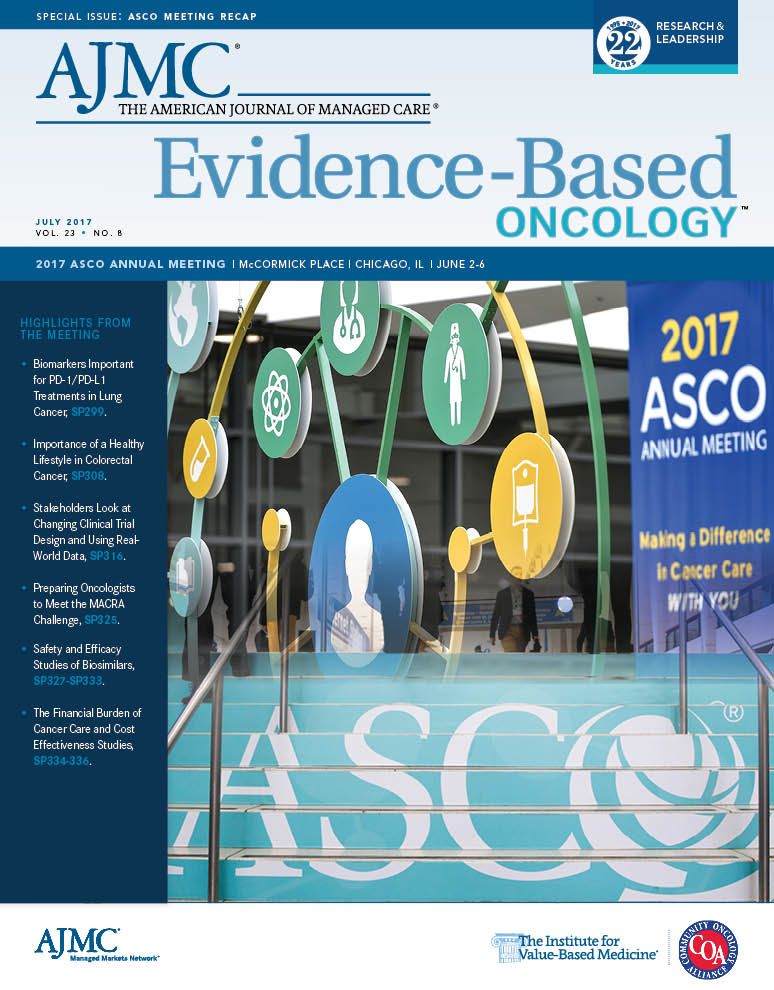- Center on Health Equity & Access
- Clinical
- Health Care Cost
- Health Care Delivery
- Insurance
- Policy
- Technology
- Value-Based Care
Alectinib May Be a New Standard of Care for Treatment-Naïve ALK-Positive NSCLC
A late-breaking abstract at the 2017 American Society of Clinical Oncology Annual Meeting showed that alectinib demonstrates efficacy and favorable tolerability compared with crizotinib in the primary results of the global phase 3 ALEX study in patients with treatment-naïve advanced anaplastic lymphoma kinase (ALK)-positive non—small cell lung cancer (NSCLC).
ALECTINIB HAS SHOWN SUPERIOR
efficacy and favorable tolerability compared with crizotinib in the primary results of the global phase 3 ALEX study in patients with treatment-naïve advanced anaplastic lymphoma kinase (ALK)-positive non—small cell lung cancer (NSCLC). This outcome was reported as a late-breaking abstract at the 2017 American Society of Clinical Oncology Annual Meeting.
Alectinib, a tyrosine kinase inhibitor that targets ALK, has shown robust efficacy in crizotinib-naïve/resistant ALK-positive NSCLC. Results of the J-ALEX trial demonstrated the superiority of alectinib 300 mg twice daily versus crizotinib in Japanese patients with crizotinib-naïve ALK-positive NSCLC (hazard ratio [HR] for progression-free survival [PFS,] 0.34; P <.0001).1
Primary results of the ALEX study of first-line alectinib, 600 mg twice daily, versus crizotinib in advanced ALK-positive NSCLC were reported. ALEX was an open-label, randomized, multicenter phase 3 trial that began in 2014 and was completed in 2017. The date for final data to be collected for analysis of PFS, the primary outcome measure, which was assessed every 8 weeks up to 33 months, was February 9, 2017.2 The primary endpoint was investigator-assessed PFS according to Response Evaluation Criteria in Solid Tumors v1.1. Systematic central nervous system (CNS) imaging was performed in all patients.
Patients with stage 3B/4 ALK-positive NSCLC, as determined by central immunohistochemical testing, were enrolled in the study. Eligible patients scored 0-2 in Eastern Cooperative Group Performance Status and had received no prior systemic therapy for advanced NSCLC. Those with asymptomatic CNS metastases were eligible to participate. Patients (n = 303) were randomized 1:1 to alectinib 600 mg or crizotinib 250 mg, twice daily. Secondary endpoints included independent review committee—assessed PFS, independent review committee–assessed time to CNS progression, objective response rate (ORR), overall survival (OS), and safety.
At the primary data cut-off in February 2017, alectinib had demonstrated statistically significant superiority over crizotinib, having reduced risk of disease progression or death by 53% (HR, 0.47; 95% CI, 0.34-0.65; P <.0001). Median PFS for alectinib had not been reached (95% CI, 17.7-not estimable) versus 11.1 months for crizotinib (95% CI, 9.1-13.1). Key secondary endpoints showed superiority for alectinib versus crizotinib, respectively:
- HR for independent review committee—assessed PFS: 0.50 (95% CI, 0.36-70; P <.0001)
- Median PFS: 25.7 (95% CI, 19.9-not estimable) versus 10.4 (95% CI, 7.7- 14.6) months
- Time to CNS progression, cause-specific HR of CNS progression: 0.16 (95% CI, 0.10-0.28; P <.0001)
- Investigator-assessed ORR: 83% (95% CI, 76%-89%) versus 76% (95% CI, 68%-82%; P = .09
- OS based on 25% events: HR, 0.76 (95% CI, 0.48-1.20; P = .24)
Grade 3/4 adverse events (AEs) were less frequent with alectinib than with crizotinib: 41% versus 50%, respectively. Fatal AEs occurred in 3% versus 5% of patients, respectively. Rates of AEs leading to discontinuation, dose reduction, and interruption were lower with alectinib.
The researchers concluded that alectinib showed superior efficacy and favorable tolerability compared with crizotinib and that the ALEX results support alectinib as a new standard of care for treatment-naïve ALK-positive NSCLC.
Alectinib (Alecensa) was approved in 2015 and is indicated for patients with ALK-positive, metastatic NSCLC who have progressed on or are intolerant to crizotinib. This indication was granted under accelerated approval based on tumor response rate and duration of response. Continued approval for this indication may be contingent on verification and description of clinical benefit in a confirmatory trial.3,4
The FDA designated the alectinib application as a breakthrough therapy and granted it priority review status. These distinct programs are intended to facilitate and expedite the development and review of certain new drugs in light of their potential to benefit patients with serious or life-threatening conditions.3 Alectinib was also designated an orphan drug, a designation that provides incentives such as tax credits, user-fee waivers, and eligibility for exclusivity to assist and encourage the development of drugs for rare diseases.3
Alectinib is taken orally twice daily with food until disease progression or unacceptable toxicity.4REFERENCES
1. Nokihara H, Hida T, Kondo M, et al. Alectinib (ALC) versus crizotinib (CRZ) in ALK-inhibitor naive ALK-positive non-small cell lung cancer (ALK+ NSCLC): primary results from the J-ALEX study. J Clin Oncol. 2016;34(suppl 15):9008. doi: 10.1200/JCO.2016.34.15_suppl.9008.
2. A Study Comparing Alectinib With Crizotinib in Treatment-Naive Anaplastic Lymphoma Kinase-Positive Advanced Non-Small Cell Lung Cancer Participants (ALEX). ClinicalTrials.gov website. clinicaltrials.gov/ct2/show/ NCT02075840. Updated June 6, 2017. Accessed June 30, 2017.
3. FDA approves new oral therapy to treat ALK-positive lung cancer [press release]. Silver Spring, MD: FDA; December 11, 2015. fda.gov/newsevents/newsroom/pressannouncements/ucm476926.htm. Accessed June 30, 2017.
4. Alecensa (alectinib) and you. Issued December 2015. Alecensa website. alecensa.com. Accessed June 30, 2017.


